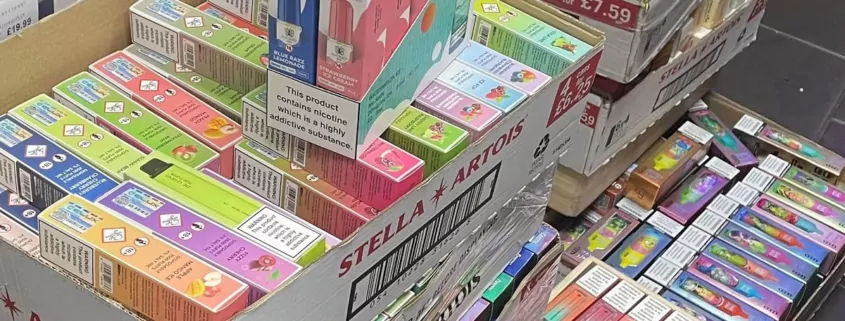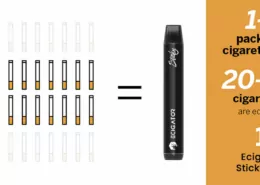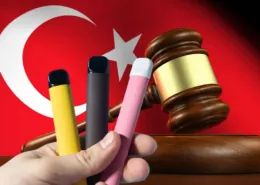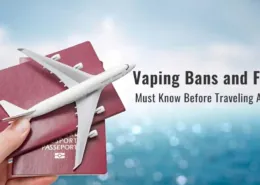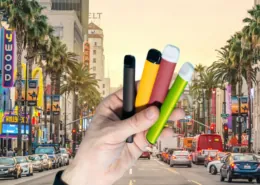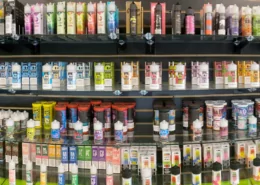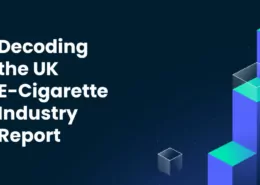Over 6 Million Illicit Vapes Seized in England in Past Three Years
Across England, a hidden battle is being waged in corner shops, warehouses, and even behind cleverly disguised walls. Trading Standards officers are on the front lines, tackling a surge in the illicit vape trade. New analysis by the BBC reveals the staggering scale of the problem: over six million illegal vaping products have been confiscated in just the past three years. As the UK prepares for a nationwide ban on single-use disposable vapes, authorities are intensifying efforts to curb this dangerous black market.
On the Hunt: Inside an Illegal Vape Raid
For officers like Paul Leighton, Senior Trading Standards Officer at Newcastle City Council, hunting for illicit vapes is part of the daily routine. His toolkit includes not just evidence bags but heavy-duty hammers and pry bars. Why? Because the methods used to conceal these illegal goods are becoming increasingly sophisticated.
“I’ve seen entire kitchens come away from walls and off the floor,” Leighton explains, highlighting the lengths some retailers go to. He’s uncovered stashes hidden inside refrigerators, barbecues, behind fake electrical fuse boxes, and even concealed by tiled panels operated by hydraulic lifts. It’s a constant cat-and-mouse game against networks often involved in other serious criminal activities.
On a typical raid, the initial find might seem small – perhaps a dozen packs tucked away behind a counter. But Leighton knows this is often just the tip of the iceberg. “It would be unusual to have so few in a shop that sells quite frequently like this,” he notes, “so it’s just a case of where they’re hiding the rest.” A search might lead to a back room, filled with rubbish and seemingly empty boxes, where persistence pays off, unearthing larger caches of the illegal products.
What Makes a Vape Illegal in the UK?
The vapes targeted in these raids are classified as illicit or non-compliant because they fail to meet strict UK legal requirements designed to ensure consumer safety. According to Trading Standards, illegal vapes often exhibit one or more of the following characteristics:
- Excessive Tank Size: Legal vapes have a maximum e-liquid tank capacity of 2 milliliters (ml). Many illegal products, particularly disposables, contain significantly larger tanks, sometimes holding up to 40ml.
- High Nicotine Strength: The maximum permitted nicotine concentration in vape liquid is 20 milligrams per milliliter (mg/ml), often expressed as 2%. Illicit products frequently exceed this limit.
- Improper Labeling: Legal vapes must display manufacturer details, ingredient lists, and clear health warnings. Illegal versions often lack this crucial information.
Health Risks and Underage Sales
The dangers posed by these non-compliant products are significant. Connor Lamb, a senior technician involved in the Newcastle checks, highlights the nicotine risk. A legal vape typically provides around 600 puffs, roughly equivalent to a pack of 20 cigarettes. “But if you get an illegal one,” he warns, “it can be anything from 200 cigarettes in one vape.” The potential health impact, especially on young people who might use them excessively, is alarming. The Medicines and Healthcare Products Regulatory Agency (MHRA) strongly advises against using illicit vapes, as their true contents and potential health risks are unknown.
The BBC’s Freedom of Information requests painted a concerning picture across England (from 133 responding councils) between 2022 and 2024:
- At least 6,169,822 illicit vapes were seized (including at ports and shops).
- Retailers were caught selling vapes to underage test purchasers 3,766 times.
- Shops sold illegal vapes during test purchases 7,594 times.
- Selling illegal vapes contributed to at least 316 shop closures (mostly temporary), while underage sales were a factor in at least 67 closures.
These figures illustrate a widespread challenge involving not just non-compliant products but also persistent underage sales.
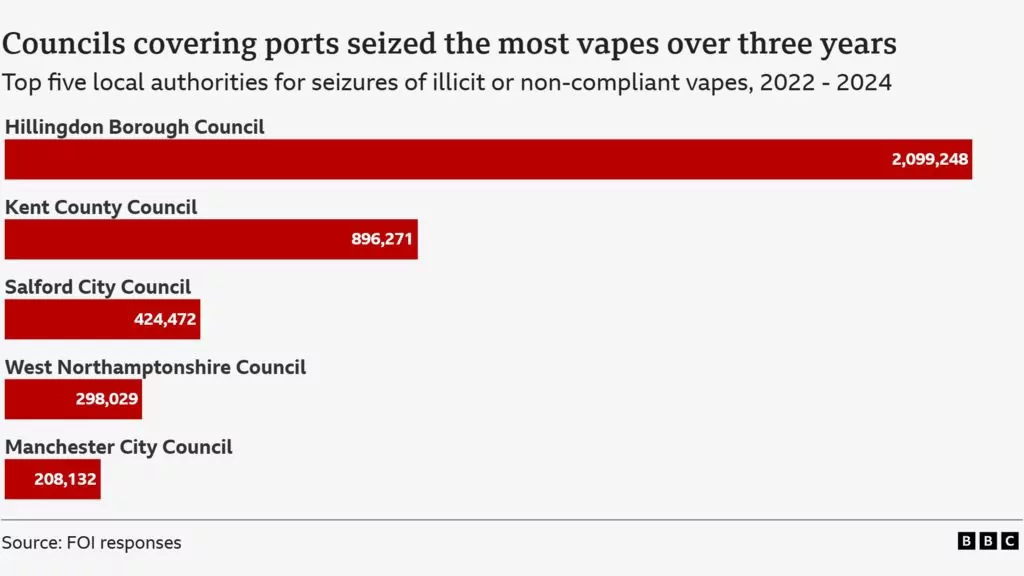
Industry Perspective and Government Response
The legitimate vaping industry emphasizes that the majority of specialist vape shops operate responsibly, primarily serving adult smokers seeking alternatives. The Independent British Vape Trade Association (IBVTA) points the finger at organized crime gangs exploiting the popularity and cash-based nature of the disposable vape market. “These business owners would never knowingly involve themselves in criminal activity,” an IBVTA spokesperson stated, adding that the association has long advocated for stronger enforcement at UK borders to stop illegal products from entering the country.
The government acknowledges the scale of the problem. The Department of Health and Social Care has allocated an extra £10 million for the current financial year to bolster Trading Standards’ efforts against underage and illicit sales. This funding is expected to support around 80 additional apprentice enforcement officers.
The Disposable Vape Ban: Hopes and Challenges
From June 1st, 2025, the landscape is set to change significantly with the implementation of a UK-wide ban on the sale, supply, and possession for sale of single-use disposable vapes. Officers like Paul Leighton hope this will curb the illegal trade significantly, as disposables are seen as its main driver. “I think we’ll see a lot less product taken off the street,” he predicts, noting that reusable vape systems have generally been more compliant.
The ban carries penalties: initial on-the-spot fines of £200, escalating to unlimited fines and potential prison sentences of up to two years for repeat offenses. Trading Standards will retain the value of on-the-spot fines to reinvest in enforcement – a move welcomed by the IBVTA, which notes that resource levels currently vary significantly across different council areas.
Despite optimism surrounding the ban, challenges remain. A national Trading Standards spokesperson acknowledged that while increased funding and targeted enforcement at major entry points like Heathrow Airport (Hillingdon council) and Dover Port (Kent council), as well as key distribution hubs like Salford, are having an impact, there’s still a “huge challenge.” Retailers willing to sell illegal stock and persistently sell to children remain a significant issue.
Back in Newcastle, Paul Leighton echoes this sentiment. He estimates millions of illegal vapes are still circulating nationwide. “It’s a constant battle trying to make a difference,” he concludes, highlighting the ongoing commitment required to protect consumers and disrupt the criminal networks profiting from this illicit trade.
- News source: Millions of vapes seized in illegal trade crackdown
- Is It Illegal to Vape or Smoke While Driving in Minnesota? - August 15, 2025
- American Airlines Vaping Passenger Alleges Assault in Police Report - August 15, 2025
- NEXA PIX 35K Disposable Vape with Crystal Tank Review - August 15, 2025

